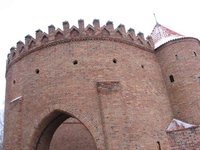Barbican
|
|
Barbican (from medićval Latin barbecana) - a fortified outpost or gateway, such as an outer defence to a city or castle and any tower situated over a gate or bridge which was used for defence purposes. Usually barbicans were situated outside of the main line of defences and connected to the city walls with a walled road called the neck.
In 15th century, with the improvement in siege tactics and artillery, barbicans lost their significance. However, several barbicans were built even in 16th century.
Barbicans remaining today
There are barbicans still preserved in:
- Czech Republic
- Germany
- Hungary
- Poland Missing image
Barbakan_Krakow.jpgBarbican in Kraków - Slovakia
- United Kingdom
There is also the Barbican Estate and Barbican Arts Centre, both in London.
The Barbican is also the name of the historic harbour area in Plymouth, England.
See also:
- Pembroke Castle (http://www.castlewales.com/pembroke.html)
- Barbican of Cracow (http://www.cracow-life.com/guide/Krakow_Old_Town/Barbican.php)
- Barbican of Pecs (http://community.webshots.com/photo/83302865/83331138aIqVtu)
- Warwick Castle (http://www.cv81pl.freeserve.co.uk/warwick.htm)
- Durham Castle (http://www.dur.ac.uk/university-college.www/Photos/barbican.jpg)
- Barbican in Warsaw (http://www.darrellpeck.com/travel/1998-east-europe/images/018-barbican.jpg)
- Chepstow Castle (http://www.chepstowe.co.uk/castle.html)
- Goodrich Castle (http://www.schools.bedfordshire.gov.uk/schools/gilbert/nsmhistory/goodrich2.htm)
- Hadleigh Castle (http://www.kingston.ac.uk/~ku00323/landslid/hadleigh.htm)
- Siklos Castle barbican (http://www.tancsics-siklos.sulinet.hu/var/kulso/barbakan.htm)cs:Barbakán

